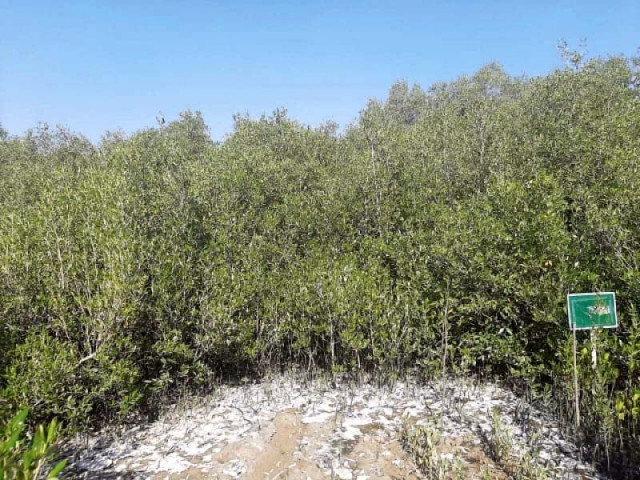Mangrove cover increases significantly
14,000 hectares have been conserved and managed in Indus Delta

"With joint efforts of the Sindh Forest Department, WWF-Pakistan and other local organisations and communities, the forest cover of mangroves has significantly increased in the Indus delta. In order to mitigate the impacts of climate change, improve fish production and promote local livelihoods, currently a total of 14,000 ha of mangroves have been conserved and co-managed in the delta." These were the views of speakers during the conclusion workshop for the first phase of WWF-Pakistan's project titled: 'Sustainable Management of the Mangrove Ecosystem and Enhance Resilience of Communities in the Indus Delta'.
This project is supported by Federal Ministry for Economic Cooperation and Development (BMZ) and WWF-Germany.
Speakers also said that in order to reduce the dependency of local communities on mangroves for fuel and fodder, they are provided with alternative options. The project aimed at protecting mangrove forests which were declining due to their extensive and unsustainable use as fuelwood, timber and fodder for the livestock.
Speaking on the occasion, Dr Tahir Rasheed, WWF-Pakistan's Regional Head for Sindh and Balochistan said that the coastal communities in Pakistan are faced with multiple challenges which include scarcity of freshwater due to construction of dams and other diversions on River Indus; decline in fish stocks due to overfishing; industrial pollution; seawater intrusion; coastal flooding; uneven rainfall patterns and food insecurity.
He mentioned that these issues have a negative impact on livelihoods, health and income generating capacity of the coastal fishers and farmers. Despite these challenges, coastal communities in the Indus delta are making efforts for their survival and showing resilience to the grave challenges posed by climatic change.
He termed the project a great step towards the protection of mangroves and the improvement of the coastal ecosystem and local livelihoods.
Arif Ali Khokar, Sindh Forest Department Conservator, said, "In the 1980s, mangrove cover was reduced to around 80,000 ha due to multiple threats. However, with integrated and well-coordinated afforestation activities of the Sindh Forest Department; and organisations such as WWF-Pakistan, IUCN and local communities; the mangrove cover has increased to 200,000 ha."
He termed it a great achievement towards restoration of the mangroves ecosystem in Pakistan.
He also added that Pakistan is the only country in the world which has reported an increase in the mangrove forests cover, making it an exceptional success story.
He also said that the Sindh government is in contact with international organisations for selling carbon credits, which are an important resource in the international market. The funds generated from these carbon credits will be spent on the well-being of coastal communities and the restoration of mangroves in the Indus delta.
Irfan Nizamani, Assistant Commissioner, Thatta, appreciated efforts for the rehabilitation and protection of mangroves in the Indus delta.
Talking about the climate change impacts, he quoted Barack Obama and said, "We are the first to face the challenges of climate change and we are the last to address it."
He further said that protecting Indus delta is our collective responsibility and we need to take joint actions to plant mangroves because they have major role in food security and mitigating the adverse impacts of climate change.
Ghani Katiyar, local activist and the president of Mehran Welfare Association, a community-based organisation (CBO) in Kharo Chan, Thatta, said that mangrove plantation in the Indus delta will help improve fish production and protect the communities from disasters. He appreciated the efforts of WWF-Pakistan for establishing freshwater storage ponds which can be used for four to six months.
The project has enabled a total of six CBOs, which have been actively participating in project-related activities and promoting sustainability of coastal resources, including mangroves, with other communities. The second phase of the project has been initiated with an aim to improve the mangrove cover and enhance community development.
Published in The Express Tribune, April 29th, 2022.



















COMMENTS
Comments are moderated and generally will be posted if they are on-topic and not abusive.
For more information, please see our Comments FAQ